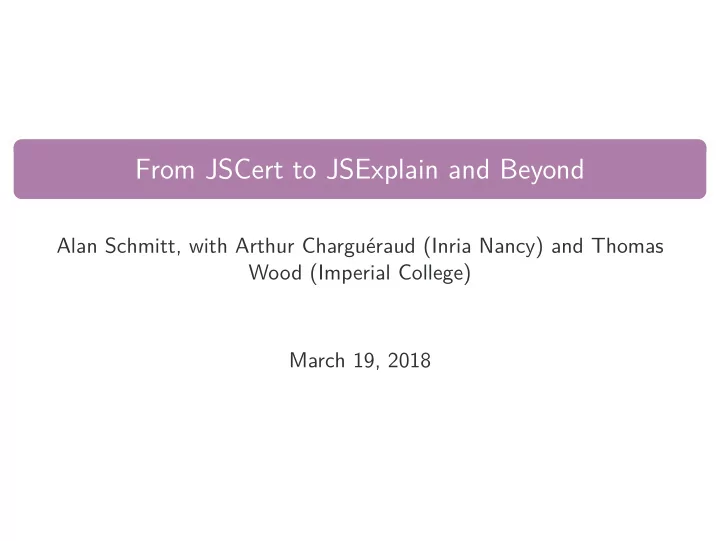

From JSCert to JSExplain and Beyond Alan Schmitt, with Arthur Charguéraud (Inria Nancy) and Thomas Wood (Imperial College) March 19, 2018
From JSCert
What is JSCert? Two JavaScript semantics in Coq descriptive given a program and a result, say if they are related executable given a program, compute the result Correctness If program P executes to v, then P and v are related 2 years, 8 people 18 klocs of Coq
Overview Coq world “real” world OCaml extraction Parser JSRef JSCert Correctness
Positive Outcomes good coverage of the core of ECMAScript 5.1 code extraction from JSRef 1 instrumented to report coverage 2 run the test suite 3 fjnd places not executed (not tested) 4 relate to parts of the spec not tested 5 discover discrepancies between implementations
Scaling Issues Hard to keep pace with the standardisation need to update two formalizations and a correctness proof JSCert inductive defjnition is too big no inversion possible, preventing most proofs
Lessons many low hanging fruits from an implementation close to the spec maintain a single artefact, derive other formats from it the Coq formalization should be usable for proofs
To JSExplain
An OCaml interpreter of JavaScript very close to the specifjcation based on the extraction from JSRef uses a tiny subset of OCaml in monadic style functions, tuples, shallow pattern matching, records 1. Let lprim be ? ToPrimitive(lval). 2. Let rprim be ? ToPrimitive(rval). 3. If Type(lprim) is String or Type(rprim) is String, then a. Let lstr be ? ToString(lprim). b. Let rstr be ? ToString(rprim). c. Return the string-concatenation of lstr and rstr. 4. Let lnum be ? ToNumber(lprim). 5. Let rnum be ? ToNumber(rprim). 6. Return the result of applying the addition operation to lnum and rnum.
An OCaml interpreter of JavaScript then ( Coq_value_prim w2) in let %number (s4, n2) = to_number s3 c let %number (s3, n1) = to_number s2 c ( Coq_value_prim w1) in else res_out ( Coq_out_ter (s4, (res_val ( Coq_value_prim ( Coq_prim_string (strappend str1 str2)))))) let % string (s4, str2) = to_string s3 c ( Coq_value_prim w2) in let % string (s3, str1) = to_string s2 c ( Coq_value_prim w1) in || (type_compare (type_of ( Coq_value_prim w2)) Coq_type_string ) very close to the specifjcation (type_compare (type_of ( Coq_value_prim w1)) Coq_type_string ) if let %prim (s2, w2) = to_primitive_def s1 c v2 in let %prim (s1, w1) = to_primitive_def s0 c v1 in and run_binary_op_add s0 c v1 v2 = functions, tuples, shallow pattern matching, records uses a tiny subset of OCaml in monadic style based on the extraction from JSRef res_out ( Coq_out_ter (s4, (res_val ( Coq_value_prim ( Coq_prim_number (n1 +. n2))))))
Compiled to JavaScript motivations: run it in a browser uses compiler-libs to generate a typed AST, which we translate target is a tiny subset of JS functions, objects (no prototype), arrays, string, numbers var run_binary_op_add = function (s0, c, v1, v2) { return (if_prim(to_primitive_def(s0, c, v1), function (s1, w1) { return (if_prim(to_primitive_def(s1, c, v2), function (s2, w2) { if ((type_compare(type_of(Coq_value_prim(w1)), Coq_type_string()) || type_compare(type_of(Coq_value_prim(w2)), Coq_type_string()))) { return (if_string(to_string(s2, c, Coq_value_prim(w1)), function (s3, str1) { return (if_string(to_string(s3, c, Coq_value_prim(w2)), function (s4, str2) { return (res_out(Coq_out_ter(s4, res_val( Coq_value_prim(Coq_prim_string(strappend(str1, str2))))))); }));})); }; } else { ... }})); }));
and to Pseudo JavaScript } } return (n1 + n2); var %number n2 = to_number w2; var %number n1 = to_number w1; return (str_app(str1, str2)); var %string str2 = to_string w2; var %string str1 = to_string w1; || type_cmp(type_of(w2), Type_string))) { if ((type_cmp(type_of(w1), Type_string) var %prim w2 = to_primitive_def v2; var %prim w1 = to_primitive_def v1; var run_binary_op_add = function (v1, v2) { }; return (run_binary_op(op, v1, v2)); to be readable while staying close to JavaScript function (op, e1, e2) { hide state and context monadic extension of var pattern matching hide type changes var run_expr_binary_op = switch (op) { var %run v2 = run_expr_get_value(e2); case Coq_binary_op_and: return (run_binary_op_and(e1, e2)); case Coq_binary_op_or: return (run_binary_op_or(e1, e2)); default : var %run v1 = run_expr_get_value(e1); }; } else {
JSExplain instrument the generated JavaScript to record events Enter (enter a function) CreateCtx(ctx) (new function scope) Add(ident,value) ( let binding) Return (return from a function) executing the instrumented interpreter generates a trace of events web tool to navigate these traces
Architecture program generator tracing generator trace web page program interpreted interpreted Interpreter AST of (JS) with traces Interpreter (JS) Libraries (OCaml) and libraries Esprima
Demo
And Beyond
JSExplain extension to current version of JavaScript ongoing, we now can debug it using jsexplain itself engineer hired to work on this in September towards a typed specifjcation? PR 1135: Explicitly note mathematical values Issue 496: abstract operations don’t always return Completion Records better trace navigator links to the specifjcation
Coq Extraction needed to prove invariants of the specifjcation modular description of the semantics with a simpler induction principle POC for a small language 1 https://jobs.inria.fr/public/classic/en/offres/2018-00432 we’re hiring! 1 (For postdoctoral and PhD positions.)
Generalization to Other Languages MLExplain 2 plans to do it for Hop.js framework to describe semantics 2 https://github.com/Docteur-Lalla/mlexplain/tree/mlexplain
Recommend
More recommend